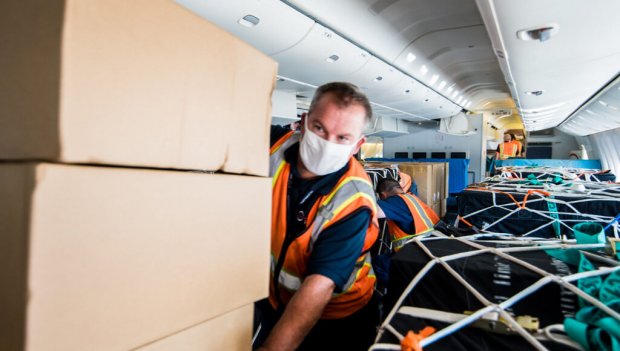Cargo’s Economic Impact Ripples Through the Region

Crews at PIT work to offload a Cathay Pacific cargo flight from Ho Chi Minh City, Vietnam in September. (Photo by Beth Hollerich)
In September, when Cathay Pacific Airways touched down for the first time at Pittsburgh International Airport bringing international cargo service back to the region, the plane brought more than just boxes.
Cargo service carries huge economic benefits for regions like Western Pennsylvania because of the downstream economic impact, including trucking and handling companies.
“If you get a steady flow of cargo like we have with these Cathay flights, it’s massive because it’s not just the airport,” said Nate Hankinson, president of Pittsburgh-based NJH Consulting, which focuses on supply chain and logistics. “It’s the truckers, the ground handlers, the extended trucking network and everyone that works at these places.”
Companies like Dandy Service Corp., an Allegheny County-based trucking company, don’t normally carry air freight, but the work has been good for the company, said president Dan Lang.
Lang said he hopes the business leads to even bigger and better things at the airport, which in turn, means more business for the region.
“All of our drivers are domiciled here. The truck line is based here,” he said. “So yes, it is helping. We’d like to see it continue to grow.”
Cargo has become a bigger part of PIT’s business plan as officials look to build the airport into an international logistics center, capitalizing on its abundant space and ideal geographic location. That has continued during the COVID-19 pandemic, even as passenger service has plummeted.
Hong Kong-based Cathay Pacific committed to 20 scheduled cargo flights in partnership with freight forwarder Unique Logistics International. The flights will run through November.
Over the last few months, National Airlines landed five FEMA charter flights at PIT carrying critical medical supplies from South Korea via a refueling stop in Anchorage. Qatar Airways Cargo served PIT for two years with twice-weekly international freighter service until suspending the operation in December amid weakening global cargo demand stemming from international trade tensions.
Officials hope to secure more cargo service in the coming months.
Using economic impact modeling, airport officials estimate the Cathay Pacific flights alone will generate $16 million in direct and indirect economic impact for the region and support 48 jobs. During the two years Qatar Airways flew to PIT, a 2018 study performed by EDRG found an economic impact of $42.8 million while supporting more than 200 jobs within the region.
Companies associated with air cargo often look to cluster their facilities near cargo gateway airports, creating a larger ecosystem that continues to build with additional jobs and development, PIT officials said.
Hankinson said major cargo gateways like Chicago and New York have entire industries built around air cargo. A similar economic impact in Western Pennsylvania could be huge, he said.
“Then, all of a sudden, you could start getting bigger passenger planes here where they’re using the belly space for cargo because they know that, ‘OK, Pittsburgh has an infrastructure that is in place. Instead of sending the A321, we’ll send an A330 in with some belly space on it.’ It starts to have a ripple effect,” he said.
Taylor Bachmann, general manager for Worldwide Flight Services, a ground handling company at PIT that works with both cargo and passenger traffic, said the additional cargo business during the pandemic has been key.
“Obviously, any additional charters that come through are unexpected bumps to our budget,” Bachmann said. “With COVID times and all the passenger flights diminishing—that was a lot of our business here, so having any type of supplemental income come through like this is huge for us. It’s definitely helping us get through this pandemic.”
Much of the work associated with cargo logistics involves blue-collar jobs like warehouse workers, forklift drivers and other labor-intensive work.
“It’s not just good for us, it’s good for every vendor here at the airport,” Bachmann said. “The fuel alone for the fueling vendors is huge. To have these come through is a huge bump to everyone’s revenue.”
Plans to accelerate cargo expansion at PIT received a major boost last year when the U.S. Department of Transportation announced an $18.69 million BUILD grant to support the construction of a 75,000-square-foot cargo processing facility and an adjacent surface parking lot.
Additionally, airport officials signed an agreement with Ted Stevens Anchorage International this summer to collaborate in better streamlining the global air cargo supply chain.
View more HERE


